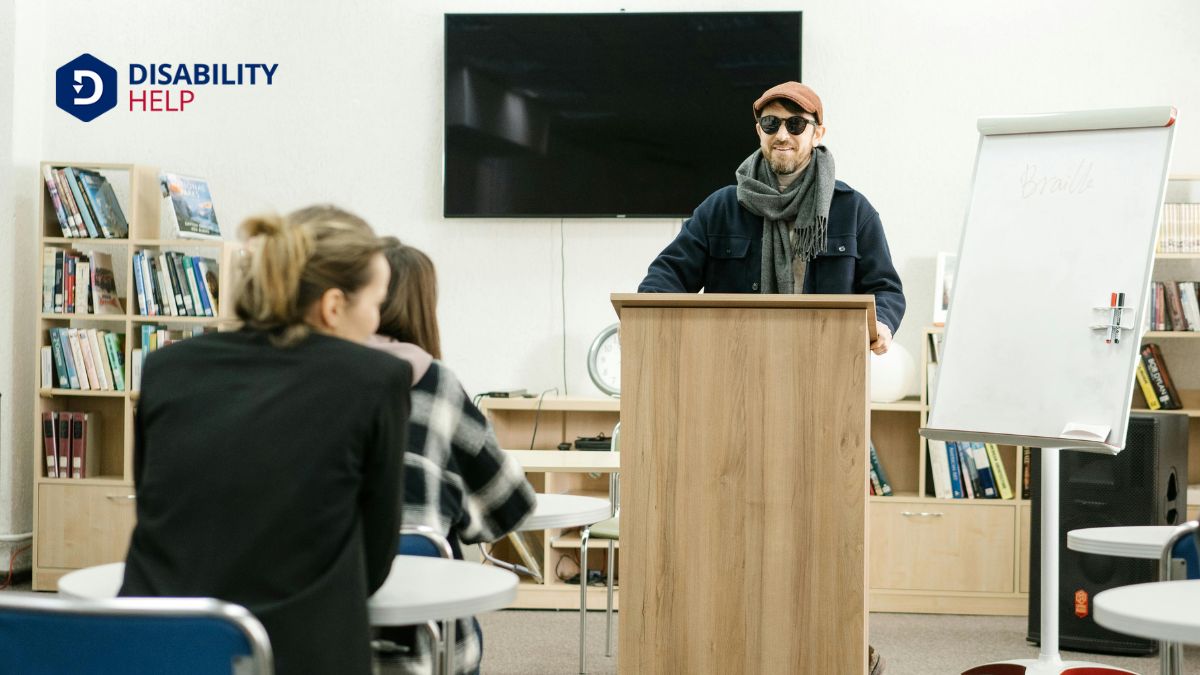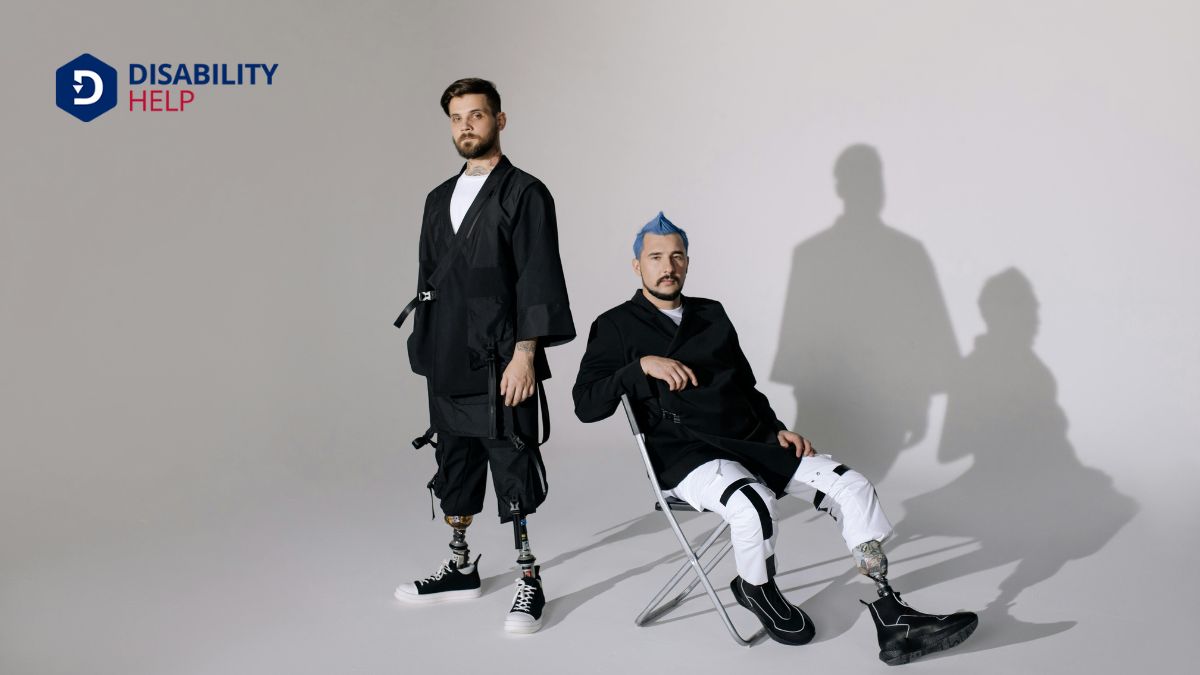Understanding our healthcare rights as disabled individuals is vital. Healthcare providers must make reasonable adjustments and ensure that facilities are accessible, adhering to ADA standards. Effective communication is another cornerstone; appropriate aids and interpreter services make a significant impact. Legal protections guarantee non-discrimination, privacy, and necessary accommodationsModifications or adjustments in healthcare settings to support patients with disabilities. under laws like the ADA. While balancing accessibilityThe design of products, devices, services, or environments to be usable by people with disabilities.... and financial sustainability is critical, our right to receive care can't be refused based on disability. Safeguarding privacy when sharing medical information is equally significant. By understanding these rights, we can better advocate for ourselves and uphold accountability in our healthcare experiences. Let's explore further.
Key Takeaways
- Healthcare providers must make reasonable modifications and ensure physical accessibility for individuals with disabilities under ADA standards.
- Effective communication aids, including sign language interpreters and digital accessibility, are necessary for disabled individuals' proper healthcare.
- The ADA protects disabled individuals' rights to privacy, non-discrimination, and reasonable accommodations in healthcare settings.
- Legal protections under national disability laws, such as the ADA and IDEA, safeguard disabled individuals across various life aspects.
- Financial capabilities are considered when providing accessible services, but care cannot be denied based on disability alone.
Reasonable Modifications
When it comes to healthcare, reasonable modifications are necessary to ensuring that people with disabilities have equal accessThe principle that all individuals, including those with disabilities, should have equal opportunity... to services. Health care providers must adaptA grassroots disability rights organization in the U.S. that focuses on promoting community-based se... their policies, practices, and procedures to accommodate various disabilities. These modifications span a wide range to address the unique needs of individuals, ensuring no one is left behind.
For instance, patients with anxiety might benefit from early appointments to avoid crowded waiting rooms. Those with mobility disabilities may need a companion to assist them during their visit. Modifying paperwork policies can help patients with brain injuries who might struggle with extensive forms. Additionally, allowing service dogs for patients with seizure disorders is essential for their safety and well-being.
These reasonable modifications aren't just about convenience; they're about ensuring equal access to essential healthcare services. It's our responsibility to advocate for and understand these adjustments so that everyone receives the care they deserve.
Physical accessibility is also a key component, ensuring that places like hospitals, doctors' offices, pharmacies, and dentists' offices are all equipped to serve individuals with disabilities effectively.
Accessible Facilities

Let's discuss how accessible facilities in healthcare settings are essential for ensuring equal access to medical care.
We need to prioritize physical accessibility requirements, such as wide doorways and clear pathways, as well as accessible medical equipment like examination tables and patient lifts.
Physical Accessibility Requirements
Ensuring healthcare facilities are physically accessible is [CRITICAL] for providing equitable care to individuals with disabilities. It's not just about meeting legal standards; it's about recognizing healthcare rights and [GUARANTEEING] everyone can access facilities and services. This includes people with mobility, sensory, intellectual, psychiatric, or other impairments.
To be physically accessible, healthcare facilities must-have features like wheelchair-accessible bathrooms, clear pathways, and lever-handled doors. Hospitals, doctors' offices, and pharmacies should all comply to make sure their services are available to everyone.
For instance, entry doors and hallways must be wide enough to accommodate wheelchairs, and parking spaces should meet ADA standards.
Accessible examination rooms are [ESSENTIAL] too. They should have wide entry doors, clear pathways, and ample floor space to [ENSURE] that those with disabilities can navigate easily and receive proper care.
It's [CRUCIAL] to contact your local ADA Center for guidance on these physical accessibility requirements to [GUARANTEE] compliance and truly uphold healthcare rights.
Accessible Medical Equipment
Accessible medical equipment is a cornerstone of fair healthcare for individuals with disabilities. We must recognize that examination tables, imaging machines, scales, and patient lifts are essential for providing thorough care. These pieces of accessible medical equipment guarantee that everyone can receive the same level of medical attention regardless of their physical abilities.
Facilities must adhere to the 2010 ADA Standards for Accessible Design when equipping their examination rooms. This means having wide entry doors, clear pathways, and sufficient floor space for maneuverability. It's not just about the equipment; it's about making the entire facility accessible.
This includes parking spaces, lever-handled doors, wheelchair-accessible bathrooms, and unobstructed pathways, all designed to meet the needs of individuals with disabilities.
We should also remember the importance of local resources. Contacting your local ADA Center can provide invaluable guidance on ensuring both accessible medical equipment and facilities for individuals with disabilities. By following these standards and seeking expert advice, we can make sure that our healthcare environments are truly inclusive and accessible for all. Let's work together to create a healthcare system that leaves no one behind.
ADA Compliance Standards
While available medical equipment is fundamental, the broader scope of ADA compliance standards guarantees that healthcare facilities are physically accessible to all. This means ensuring our health rights, including maneuvering through facilities without obstacles. ADA compliance is pivotal because it mandates features like wide doorways, accessible parking spaces, and clear pathways for mobility devices. These elements aren't just conveniences; they're essential for creating an inclusive environment where everyone can seek and receive medical care.
To achieve ADA compliance, facilities must adhere to the 2010 ADA Standards for Accessible Design. This includes having examination rooms equipped with accessible medical equipment and designed to accommodate various disabilities. These standards ensure that individuals with disabilities can navigate healthcare facilities and receive necessary medical care effectively.
We all deserve healthcare services that are accessible and respectful of our rights. By meeting ADA compliance standards, healthcare providers affirm their commitment to inclusivity and equality. When facilities are accessible, it removes physical barriers, making healthcare a domain where everyone, regardless of their physical condition, can participate fully.
Let's continue advocating for these standards to guarantee our health and rights are protected and that accessible healthcare is a reality for all.
Effective Communication

Now, let's focus on effective communication, which is crucial for guaranteeing equal access to healthcare services for individuals with disabilities.
We need healthcare providers to offer communication aids, adhere to digital accessibility standards, and provide interpreter services when necessary.
Communication Aids Required
Health care providers must guarantee we've efficient communication by offering suitable communication aids or services tailored to each patient's needs. These aids play a crucial role in helping us fully understand and participate in our own care. For those of us who are Deaf, sign language interpreters are essential. They translate spoken language into sign language, playing a crucial role in grasping every detail discussed during medical appointments.
Patients with speech disabilities may need relay services, which help convey spoken messages clearly and accurately. Similarly, individuals with low vision benefit from readers who can read printed material aloud, making it accessible. These communication aids are designed to cater to our specific needs, ensuring we don't miss critical health information.
The complexity of our communication needs and the setting in which we're receiving care also play a role in determining the appropriate aids. For example, a hospital setting might require on-site interpreters, while a telehealth session might need video relay services.
Hospitals are obligated to provide these aids, ensuring those of us with hearing, vision, or speech disabilities receive the same level of care and understanding as anyone else. Efficient communication in healthcare isn't just a courtesy—it's our right.
Digital Accessibility Standards
In addition to physical aids, ensuring digital accessibility is necessary for effective communication in healthcare settings. When health care providers make websites, health records, telecommunication, and telehealth servicesThe use of telecommunication technology to provide healthcare and rehabilitation services remotely, ... accessible, they help patients with disabilities communicate effectively. This isn't just beneficial; it's required to meet ADA requirements.
Effective communication tools are essential. For instance, sign language interpreters for Deaf patients and readers for those with low vision guarantee that all patients can understand their health information. Relay services for individuals with speech disabilities are another key component, allowing these patients to convey their needs and receive pertinent information.
Clear guidelines on digital accessibility standards are essential. They help healthcare entities comply with ADA requirements and guarantee that information is equally accessible to all patients, regardless of their disability.
By following these guidelines, healthcare providers can ensure that patients with disabilities have the same access to digital communication tools as everyone else.
Ultimately, when healthcare providers prioritize digital accessibility, they foster an environment of inclusivity and support. This guarantees that all patients, regardless of disability, can access and understand their healthcare information effectively.
Interpreter Services Provided
Effective communication is the cornerstone of quality healthcare for all patients, including those with disabilities. To guarantee this, healthcare providers must offer interpreter services that cater to the diverse needs of patients with hearing, vision, or speech disabilities. These services can include sign language interpreters for Deaf patients, readers for individuals with low vision, and relay services for those with speech disabilities.
Our commitment to effective communication means tailoring these services to fit each patient's specific needs, considering the complexity of their condition and the healthcare setting. For example, in a hospital environment, clear communication is essential for accurate diagnosis and treatment. Hence, hospitals must provide necessary interpreter services to bridge any communication gaps between healthcare providers and patients with disabilities.
In the digital age, it's also important to guarantee digital accessibility. This includes making telehealth services, websites, health records, and telecommunications accessible to everyone, ensuring that no patient is left behind.
Legal Rights and Protections

When it comes to legal rights and protections, the Americans with Disabilities Act (ADA)A U.S. law that prohibits discrimination against individuals with disabilities in all areas of publi... plays a vital role in safeguarding the healthcare rights of individuals with disabilities. The ADA guarantees that no one is discriminated against based on their disability, providing essential legal protections in various healthcare settings.
The ADA is a cornerstone of Disability RightsThe legal and human rights afforded to individuals with disabilities, often the focus of advocacy an..., emphasizing Healthcare Access by mandating that facilities like hospitals, doctors' offices, and pharmacies are accessible to everyone. It requires these places to offer reasonable accommodations, such as ramps or accessible examination tables, ensuring that all individuals can receive the care they need.
Moreover, the ADA enforces Legal Protections that extend to privacy and non-discrimination. This means healthcare providers must adjust their policies and practices to offer equal healthcare access. For example, they must provide effective communication aids like sign language interpreters or written materials in accessible formats, making sure everyone understands their medical information.
Additionally, resources and legal advocacyThe use of legal means, including litigation and policy work, to advance the rights of individuals w... services are available to help us comprehend and assert our rights under the ADA. By knowing our legal protections, we can guarantee that our healthcare needs are met without barriers, promoting a more inclusive and equitable healthcare system for all.
National Disability Laws
Several key national disability laws guarantee that individuals with disabilities have equal opportunities and protections. The Americans with Disabilities Act (ADA) is perhaps the cornerstone, prohibiting discrimination based on disability in various areas, including healthcare. This law guarantees that healthcare providers meet specific access requirements, making it easier for disabled individuals to address their healthcare needs.
The Individuals with Disabilities Education Act (IDEA) is another essential law that guarantees that children with disabilities receive free and appropriate public education. By supporting their well-being and development, IDEA helps disabled children reach their full potential.
Housing is another area where national laws play an important role. The Fair Housing Act prohibits discrimination based on disability, ensuring that disabled individuals have access to inclusive and accessible housing options. This law helps create a more equitable living environment for everyone.
When it comes to travel, the Air Carrier Access Act mandates that air transportation be accessible to individuals with disabilities. This guarantees that disabled passengers can travel with fewer barriers.
Lastly, the Voting Accessibility Act mandates that polling places be accessible to disabled voters. This promotes their right to participate fully in the democratic process, guaranteeing their voices are heard.
Undue Financial Burden
Healthcare facilities sometimes claim undue financial burden as a reason for not making specific accommodations for disabled individuals. When we hear this, it's important to understand that several factors come into play. Things like cost, the size of the facility, and the nature of their operations are all considered when determining whether an accommodationAdjustments or modifications provided to individuals with disabilities to ensure equal access and pa... truly imposes an undue financial burden.
While providers are required to meet ADA requirements, they must also balance these obligations with their financial capabilities. This means they can't deny care based on disability, but they can refuse to implement changes that would cause an undue financial burden.
The determination of what constitutes an undue financial burden is made on a case-by-case basis. It involves weighing the impact of the expenses or the difficulty of making those specific accommodations.
Understanding this balance helps us see both sides of the issue. Healthcare entities have an obligation to provide accessible services for disabled individuals, but they also need to maintain financial viability.
Sharing Information Safely
Balancing financial constraints with the need to provide adequate care is a challenging aspect of healthcare for disabled individuals. Equally important is making sure that we share our child's medical information safely and protect their privacy.
As parents, we've the right to request and review our child's medical files to verify accuracy and privacy. This enables us to correct any errors and keep a close watch on who's access to this sensitive information.
When it comes to sharing, medical information about our child's diagnosis or treatment can only be disclosed to authorized individuals for specific purposes. This guarantees that our child's privacy is maintained and that sensitive details aren't shared indiscriminately.
Importantly, we retain the right to revoke the release of our child's medical information at any time if we feel it necessary.
Safeguarding our child's privacy includes controlling how and with whom we share their medical information. We can seek guidance to understand the best practices for sharing this information safely, making sure we always protect their rights. By being proactive and informed, we can navigate these complex issues and safeguard our children's healthcare privacy effectively.
Resolution of Violated Rights

When our child's healthcare rights are violated, taking immediate and decisive action is essential. First, we need to document every incident meticulously. Keeping detailed records will strengthen our case. We should identify which specific rights have been violated by referring to lists and laws like the Disabilities Education Act (IDEA).
Understanding the exact nature of the violation within the context of the United States healthcare system helps us communicate our grievances clearly.
Next, seeking assistance from organizations and legal professionals experienced in disability rights can make a significant impact. These experts can guide us through the complexities of the law and advocate on our behalf. If our initial efforts don't yield results, escalating the issue to higher authorities ensures it receives the attention it deserves.
Proper investigation and resolution often require persistence and a willingness to push for accountability.
Connecting with other parents and individuals facing similar challenges provides invaluable support. Sharing experiences can offer practical advice and potential advocacyThe act of arguing in favor of, supporting, or defending the rights and interests of individuals or ... opportunities. By standingThe legal right to bring a lawsuit, which requires that the individual bringing the suit has a direc... together, we amplify our voices, making it harder for injustices to go unnoticed. Remember, public accommodations must respect the rights of people with disabilities, and we're entitled to fight for those rights.
Frequently Asked Questions
What Are the Four Fundamental Rights for People With Disabilities?
We've got to remember the four fundamental rights for people with disabilities: accessibility, effective communication, reasonable modifications, and freedom from discriminationThe right to be free from unfair treatment based on characteristics such as disability, race, gender.... These rights guarantee they can access healthcare, communicate effectively, receive accommodations, and avoid unfair treatment.
Why Is Healthcare Important for People With Disabilities?
Healthcare is crucial for people with disabilities because it promotes early interventionServices provided to young children with developmental delays to improve outcomes, including therapi..., prevents secondary conditions, and enhances overall well-being. We need regular visits to maintain peak health, manage chronic conditions, and improve life quality, promoting inclusionThe practice of creating environments in which any individual or group can be and feel welcomed, res... and equityFairness and justice in the way people are treated, especially in the allocation of resources and op....
What Are the Rights of People With Disabilities Summary?
We all have the right to accessible healthcare. People with disabilities are entitled to equal access, effective communication, and reasonable modifications under the ADA. Healthcare providers must guarantee accommodations and can't refuse care based on disability.
What Is a Barrier to Healthcare for People With Disabilities?
We face numerous barriers to healthcare, including physical obstacles, communication issues, and attitudinal biases. These challenges can prevent us from accessing the care we need. It's essential we address these barriers to guarantee equitable treatment for everyone.
Conclusion
In understanding healthcare rights for disabled individuals, we've covered vital areas like reasonable modifications, accessible facilities, and effective communication. We've also highlighted legal rights, national disability laws, and undue financial burdens. It's pivotal to share information safely and know how to resolve violated rights. Let's stay informed and advocate for these rights, ensuring everyone's treated with respect and dignity. Together, we can make healthcare truly inclusive for all.





